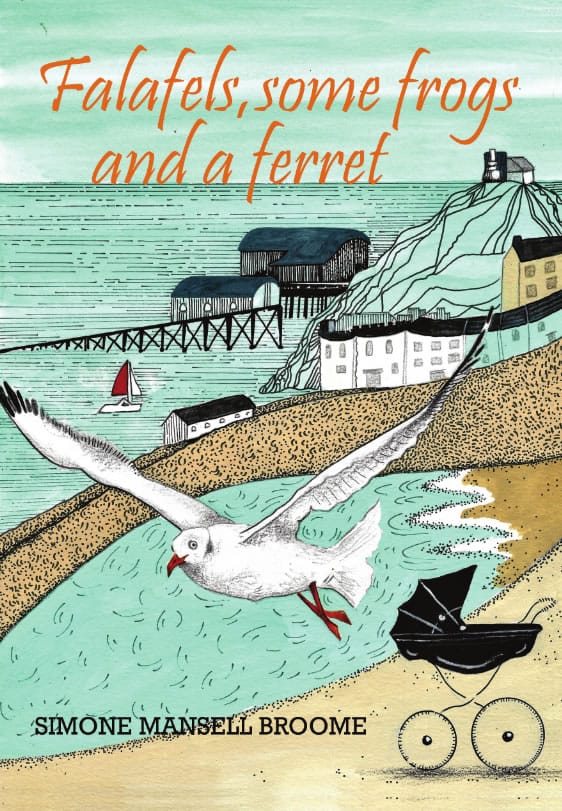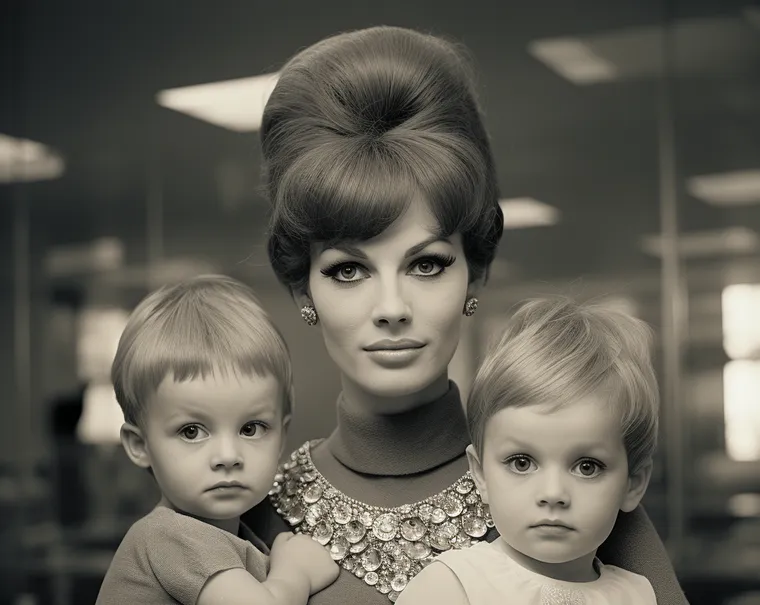We lived opposite a fallen woman. We knew that’s what she was because she was living in sin. And with a married man…which was worse. She was also young, pretty and friendly, and my mum liked her.
2024 poetry –‘Bracing’ , 2023 memoir - ‘Falafels, some frogs and a ferret’, 2023 poetry - ‘A cwtch in Kyrenia’
The FW and her man – I didn’t know what to call him but he wasn’t, of course, her husband – had two children, twins, a boy and a girl – and an indoor double swing in their attic playroom. I loved swinging on it. I don’t remember the names of the children now but I know they shared an initial – maybe they were Roddie and Rosie, or Bernie and Barbara. Something like that.
I’ve always associated siblings who share the same first letter of their Christian names, (and people whose first name and surname begins with the same letter), with the exotic, the alien and the glamorous. Like Marilyn Monroe, Brigitte Bardot and stars of old movies loved by my father – Claudette Colbert, Simone Signoret, etc. You’ll notice the French bias. There were exceptions, like a woman I was friendly with in my early days of motherhood – not alien at all, a sympathetic fellow first timer, but actually rather elegant. And Marilyn and Mervyn, twins, again, who were neither alien nor exotic. I played with them for a short while after we left Wales.
It was a forced friendship. My mother had obviously met their mother somewhere – an achievement in itself as Mum was always working – and arrangements were made. We didn’t call them playdates then. I remember ludo, snakes and ladders, a little lukewarm ping-pong and a summer of pretend, dressing-up weddings in our scruffy back garden. Marilyn was a stolid, rather unimaginative child. Mervyn was put-upon but uncomplaining. Wilbur, our first family cat, was usually lavishly costumed and found a small role in the nuptials. The twins and I drifted apart by the time I was eight. There was an older brother who made the skin crawl on the back of my neck. Of course, I never mentioned his creepiness to anyone.
*
The conversations of others have always been fair game. My children used to accuse me of having elephant ears. Much of what I gleaned about fallen women, and indeed the dynamics between man and woman, came from overheard snippets of female chats, confidences, gossip.
You might become a fallen woman, if you let yourself fall for someone, (possibly unsuitable), or fall in love, fall off your pedestal or fall from grace. You could get caught out or caught. You could fall pregnant. And it was a truly terrible thing if this was – out of wedlock. A woman’s life, it seemed, was about avoiding men while playing some sort of tag, ducking and diving, and running faster. You had to be watchful and wary. And faster. But not in the wrong way. It also, strangely, seemed to be down to women, the ones who would get married, to find a man in the first place. And what became apparent to me was that men didn’t want to get found or caught. Except the wrong sort.
*
I think my mum was always close to her sister. There were just the two of them. My aunt was creative, practical, talented at all crafts, domestic, a homemaker. She wanted children. She would have loved a daughter. She married, in her early thirties, a divorced man who was bringing up three teenage boys. My aunt then gave birth to two sons. She was one of the very few women I knew, in my childhood, who had encountered divorce in any way at all.
When Mum married and moved to Wales, she lost her sibling and lifelong ally. Mum wasn’t really happy in Tenby. I’m not sure what she expected, but I think she must have felt an outsider in a close community. The man she married had four siblings, and, apart from the older sister who had introduced my parents in the first place, Mum struggled to feel accepted by his family. She worked and she ran a small guesthouse. She was married for five years before having a baby. These things cemented her nonconformity.
She believed herself to be of non-conformist, Protestant stock, with teetotal, puritanical working-class values. In the mix was the Church Army, conscientious objectors and a generation of missing young men – I’m told my grandmother’s heart never fully mended. My mother’s actual, more mixed, more complex origins we are only now beginning to unravel.
*
In Tenby, it was the other non-locals she became friends with, the Irish and the Italians, hardworking incomers like herself. The people she got to know were all Catholic, and so it was decided that I, and then my sister after me, would attend convents. In my case three of them, until I was eleven; in my sister’s, three of them, until she was sixteen. For a while, from when I was eight or nine, I made a rather pretty altar in and around the Victorian fireplace of my bedroom. I had designs on beatification, and, ultimately, canonization, and knew this was a big ask.
My father’s older sister, that onetime matchmaker, could have been defined by many as a fallen woman. No one would have dared to voice this within earshot of her immediate family. She was long gone from Wales, whilst still in her teens. At several times in her full, colourful life she was a practising Catholic; she numbered priests and monks amongst her acquaintance. This aunt had an eclectic and pragmatic relationship with God in his many earthly manifestations.
The rest of Dad’s family was mostly, in a casual kind of way, Church of England in Wales. Lowish. Minimal popery. But not Chapel.
*
At my final convent, nuns filled our heads with the lives of the saints. We were read these stories on rainy afternoons while we worked on bits of handicrafts. Mine were grubby, unpicked, reworked and never finished. My reading matter at the time was a heady combination of illicit ghost stories, tales of the Greek, Roman and Norse gods (and their frankly startling private lives), Shakespeare and children’s poetry. The gruesome life and death stories of saints slotted perfectly into this mix. There was torture, execution, martyrdom – the most comprehensive range of savagery.
Female saints seemed to have less exciting lives and far fewer adventures, and they were never really in need of much improvement, of the repentance and reformation type. But they were besieged by men constantly trying to corrupt them spiritually and corporeally. The punishments meted out to female saints were just as horrible as those experienced by the men. And, bafflingly to me at the age of nine or so, the Fall of Man was Eve’s fault too. Woman as temptress, aided and abetted by some convenient serpent. I’m as fuzzy now as I was then on the specifics, but the expression I was not to hear for many more years – it takes two to tango – did not seem to apply at all to the bible or to ecclesiastical attitudes. Women were bad, per se.
I’ve never had a fondness for incense and always lacked the attention span to sit still throughout the mass…but sin, confession, penance and redemption remain a compelling foursome.
And the flat feet, the slight dyspraxia, (never identified until decades later naturally), and the hole in my heart, didn’t predispose me to be good at running fast. Or running at all really. If anything, ducking and diving have been far more my style.
Simone Mansell Broome www.SimoneMansellBroome.com
2024 poetry –‘Bracing’ , 2023 memoir - ‘Falafels, some frogs and a ferret’, 2023 poetry - ‘A cwtch in Kyrenia’

Falafels, some frogs and a ferret
A memoir that is frivolous, serious, funny and sad – an easy read with a steely core. Interesting and illuminating bite-sized stories of family life and human relationships, anecdotes and reminiscences.


